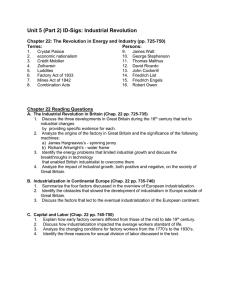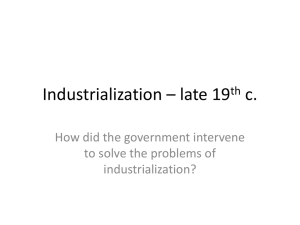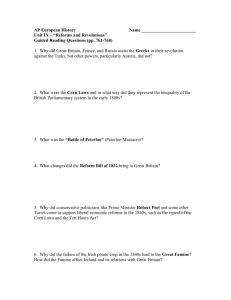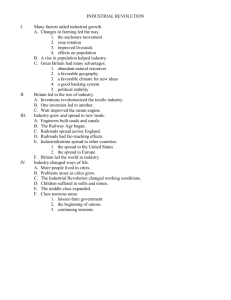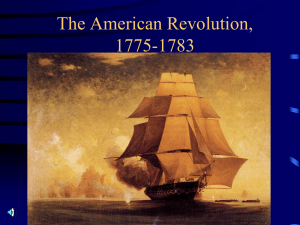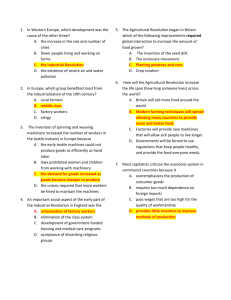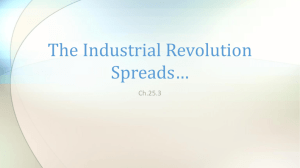Big Ideas (Formulated as Questions) Need to Know Be familiar with
advertisement
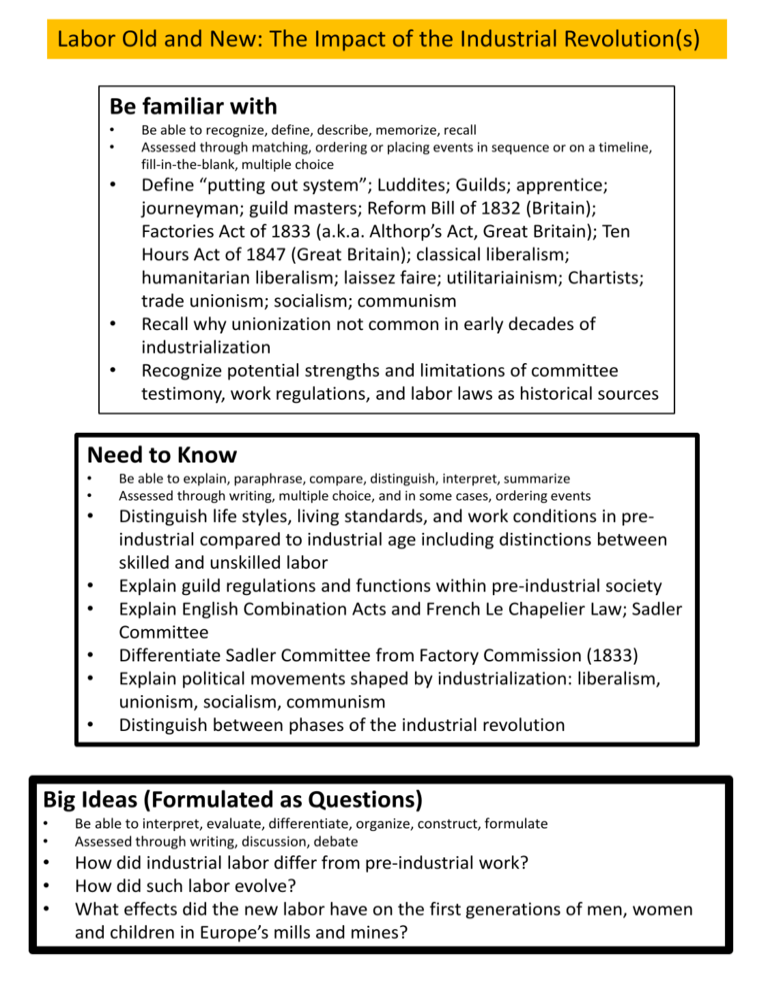
Labor Old and New: The Impact of the Industrial Revolution(s) Be familiar with • • • • • Be able to recognize, define, describe, memorize, recall Assessed through matching, ordering or placing events in sequence or on a timeline, fill-in-the-blank, multiple choice Define “putting out system”; Luddites; Guilds; apprentice; journeyman; guild masters; Reform Bill of 1832 (Britain); Factories Act of 1833 (a.k.a. Althorp’s Act, Great Britain); Ten Hours Act of 1847 (Great Britain); classical liberalism; humanitarian liberalism; laissez faire; utilitariainism; Chartists; trade unionism; socialism; communism Recall why unionization not common in early decades of industrialization Recognize potential strengths and limitations of committee testimony, work regulations, and labor laws as historical sources Need to Know • • • • • • • • Be able to explain, paraphrase, compare, distinguish, interpret, summarize Assessed through writing, multiple choice, and in some cases, ordering events Distinguish life styles, living standards, and work conditions in preindustrial compared to industrial age including distinctions between skilled and unskilled labor Explain guild regulations and functions within pre-industrial society Explain English Combination Acts and French Le Chapelier Law; Sadler Committee Differentiate Sadler Committee from Factory Commission (1833) Explain political movements shaped by industrialization: liberalism, unionism, socialism, communism Distinguish between phases of the industrial revolution Big Ideas (Formulated as Questions) • • • • • Be able to interpret, evaluate, differentiate, organize, construct, formulate Assessed through writing, discussion, debate How did industrial labor differ from pre-industrial work? How did such labor evolve? What effects did the new labor have on the first generations of men, women and children in Europe’s mills and mines? Industrial Revolutions Enlightenment Era c. 1680s Revolutions on European continent Industrialization begins in German states 1848-49 Social Democratic Party forms (Gr) 1869 1873 Ironworks operating (Gr) Eiffel Tower built (Fr) 1889 Lumière brothers build first portable movie 1895 camera (Fr) 1900 British Labour Party forms (GB) GB=Great Britain Gr= German-speaking states e.g. Prussia Fr=France US=United States Textile Phase First successful steamboat in U.S. 1807 Parliament passes law that imposes death 1811 Luddites begins (GB) penalty on those who destroy machines (GB). 1812 1813 Luddites hanged (GB) Faraday demonstrates electro-magnetic 1821 rotation (principle of electric motor) in Britain Lyon’s skilled worker 1830s demand minimum wages Liverpool-Manchester rail service begins (GB) (Fr) 1830 3 major cotton mill centers flourishing (Fr) 1832 Sadler Committee (GB) 1833 Factories Act (GB) 1834 Customs Union (Gr) Le Creusot ironworks flourishing (Fr) 1836 1780s 1789 1830s 1850s 1890s c. 1900 Electrical Phase 1799 Combination Acts Steam locomotive demonstrated (GB) 1801 1789 French Revolution 1799 Era of Industrial Revolution First power loom built in Britain 1787 Chemical Phase Spinning Jenny: one workerspin 8 spindles (GB) 1764 Water framespinning machines (GB) 1769 James Watt refines steam engine patent (GB) First steam powered mills (GB) 1779 Metallurgical Phase 1750 1910s 1930s
